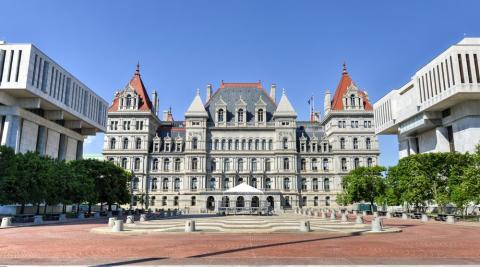With Election Day just a week away, New Yorkers are getting bombarded with millions of dollars worth of negative messaging about the constitutional convention.
While I used my previous column to detail why voters should ignore the information being spread by the “vote no” coalition, I want to focus here on some of the positive outcomes that could result from holding a convention for the first time since 1967.
For starters, I should say that the possibilities of a convention are truly endless. Comprehensive tax reform? Possible. Universal health care? Achievable. Pension protection and expanded rights for unions? Environmental bill of rights? All doable.
But if there’s one issue that I personally believe to be most crucial to the long-term interests of New York voters -- and something that the legislature absolutely will never move the needle on otherwise -- it’s election reform.
Think about it.
Elected officials are the gatekeepers to all public policy, and the only way to directly influence them is at the polls. But what happens when a state has notoriously low voter turnout and incredibly onerous election laws? Nothing good.
New York regularly “leads” the country in annual political corruption convictions. In 2015, New York State Assembly Speaker Sheldon Silver and State Senate Majority Leader Dean Skelos -- the two most powerful people after the governor -- were walked off the capital in handcuffs.
And less than two years after their convictions, the charges were overturned for both men, who will now (happily) avoid fulfilling their respective 12 and 5 year prison terms.
The sad truth is that there isn’t much the voters of New York can do to combat corruption as long as the current election laws are in place. As former Bloomberg Administration staffer and respected election reform writer Francis Barry recently wrote: “A fair examination of the record shows that no state does a better job discouraging voters from going to the polls than New York.”
New York has the earliest change of party affiliation deadline in the country, in addition to closed primaries for every race. This, in part, might explain why New York had the fourth-lowest turnout in the presidential primaries last year.
In addition, thanks to the effects of partisan gerrymandering, New York typically has some of the least competitive elections in the nation.
Last year, half of all State Senate seats were uncontested or virtually uncontested, and State Assembly races were even worse: A whopping 36% were uncontested and another 21% virtually uncontested.
So what happens when you combine rampant corruption, a severe lack of competition in elections, and the worst elections laws in the country? You get a state with the worst economic inequality in the nation. And you get a state legislature that feels no obligation to do anything to advance the rights of its constituents -- just the interests of the parties and the economic elite.
I truly believe that the only way the voters of New York voters will ever have any control over their state’s economic and political decisions is if they change the election system to give themselves more power over who represents them. That means substantially altering the electoral code of the state.
Unfortunately, since New York has no ballot initiative process, the same state legislature that leads the nation in corruption is also the gatekeeper to electoral reform.
Earlier this year, a number of political groups and prominent activists teamed up with New York Attorney General Schneiderman to pass a set of comprehensive election reform bills.
While some elected officials went to great lengths to promote their support for these reforms -- with no shortage of photo opportunities -- the state legislature ultimately made sure that nothing substantive passed into law. It was a tragic -- but not surprising -- outcome.
All of this is precisely why the constitutional convention is so crucial.
Imagine a scenario where the voters of New York -- who are systematically disempowered in pretty much every way you can imagine -- are given complete control over the State Constitution, to make any changes they deem fit, as long as the majority of their fellow voters agree with them.
That seems a lot more democratic than a notoriously corrupt legislature -- that gets elected and reelected with virtually no competition -- deciding the laws of the land, right?
But the significance of this opportunity goes beyond just making immediate changes to New York’s Constitution.
Remember the old adage: “Give a man a fish and you feed him for a day; teach a man to fish and you feed him for a lifetime?” Well that’s exactly what will happen for the voters of New York if they take advantage of this once-every-20-years process and use it to make substantive reforms to the state’s election laws.
Open primaries, ranked choice voting, independent redistricting, universal registration -- it’s all possible through the constitutional convention process.
I don’t need to explain to the readers of IVN that changing the way elected officials get elected can fundamentally alter how they behave in office.
Just look at California, where voter approval of the legislature went up by 300% after the state passed nonpartisan open primaries and independent redistricting, and the legislature started passing bipartisan legislation that Congress could only dream of -- including a recent cap and trade bill.
In New York, the only thing that legislators from both parties can agree on is limiting electoral competition, instituting voter suppression tactics, and disseminating blatant lies about the constitutional convention process.
It’s a sad state of affairs, but we can change it, New York. Vote “yes” on the constitutional convention provision next week, and we can change anything we want.
Photo Credit: Felix Lipov / shutterstock.com
